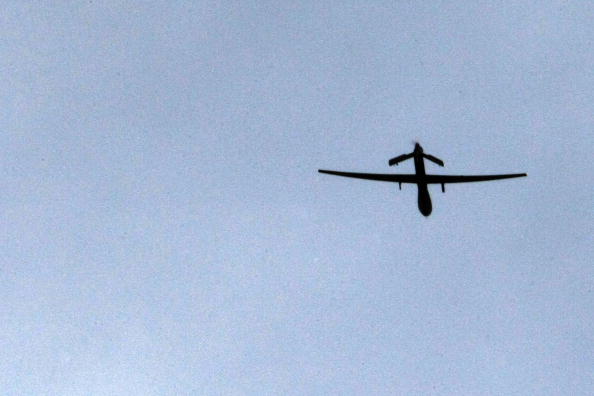The 5 biggest takeaways from leaked documents about America's drone war


A free daily email with the biggest news stories of the day – and the best features from TheWeek.com
You are now subscribed
Your newsletter sign-up was successful
Classified documents detailing the Obama administration's process of creating kill lists and initiating drone strikes were leaked to The Intercept by "a source within the intelligence community" and published online Thursday.
"This outrageous explosion of watchlisting — of monitoring people and racking and stacking them on lists, assigning them numbers, assigning them 'baseball cards,' assigning them death sentences without notice, on a worldwide battlefield — it was, from the very first instance, wrong," the source, who remained anonymous for fear of prosecution, told The Intercept.
The Intercept presented its findings in 10 parts, including a glossary and file of the documents themselves. Here are some of the biggest takeaways from the leak:
The Week
Escape your echo chamber. Get the facts behind the news, plus analysis from multiple perspectives.

Sign up for The Week's Free Newsletters
From our morning news briefing to a weekly Good News Newsletter, get the best of The Week delivered directly to your inbox.
From our morning news briefing to a weekly Good News Newsletter, get the best of The Week delivered directly to your inbox.
1. An administrative "kill chain" decides and approves who is a drone strike target. Ultimately, President Obama "signs off" on a target, but does not actually approve every individual strike. According to the documents, it took Obama an average of 58 days to sign off on a target, at which point the military has 60 days following to conduct a strike. (Read more)
2. Targets are assigned "baseball cards," or short profiles that justify their threat. The Obama administration has claimed it follows guidelines including that strikes would only be against those who posed "a continuing, imminent threat to the American people," who could not be captured, and who could be killed with the "near certainty" that civilians would not be killed or injured in the process. Documents, however, reveal that the campaign in Afghanistan isn't limited to al Qaeda and the Taliban, but also seeks to target members of local armed groups. (Read more)
3. The documents also offer support to the theory that the Obama administration categorizes civilians killed in drone strikes to be "enemies" even when they were not intended targets. The source who spoke with The Intercept called this "exaggerating at best, if not outright lies." (Read more)
4. During Operation Haymaker in northeastern Afghanistan, the U.S. only had 35 intended targets — but ended up killing over 200 people. Ninety percent of people killed in airstrikes were not the intended target. (Read more)
A free daily email with the biggest news stories of the day – and the best features from TheWeek.com
5. Intelligence is often incorrect due to a heavy reliance on technology and interpretation. "There's countless instances where I've come across intelligence that was faulty [...] It's stunning the number of instances when selectors are misattributed to certain people," the source told The Intercept. (Read more)
For the whole report, head over to The Intercept.
Jeva Lange was the executive editor at TheWeek.com. She formerly served as The Week's deputy editor and culture critic. She is also a contributor to Screen Slate, and her writing has appeared in The New York Daily News, The Awl, Vice, and Gothamist, among other publications. Jeva lives in New York City. Follow her on Twitter.
-
 The EU’s war on fast fashion
The EU’s war on fast fashionIn the Spotlight Bloc launches investigation into Shein over sale of weapons and ‘childlike’ sex dolls, alongside efforts to tax e-commerce giants and combat textile waste
-
 How to Get to Heaven from Belfast: a ‘highly entertaining ride’
How to Get to Heaven from Belfast: a ‘highly entertaining ride’The Week Recommends Mystery-comedy from the creator of Derry Girls should be ‘your new binge-watch’
-
 The 8 best TV shows of the 1960s
The 8 best TV shows of the 1960sThe standout shows of this decade take viewers from outer space to the Wild West
-
 Nobody seems surprised Wagner's Prigozhin died under suspicious circumstances
Nobody seems surprised Wagner's Prigozhin died under suspicious circumstancesSpeed Read
-
 Western mountain climbers allegedly left Pakistani porter to die on K2
Western mountain climbers allegedly left Pakistani porter to die on K2Speed Read
-
 'Circular saw blades' divide controversial Rio Grande buoys installed by Texas governor
'Circular saw blades' divide controversial Rio Grande buoys installed by Texas governorSpeed Read
-
 Los Angeles city workers stage 1-day walkout over labor conditions
Los Angeles city workers stage 1-day walkout over labor conditionsSpeed Read
-
 Mega Millions jackpot climbs to an estimated $1.55 billion
Mega Millions jackpot climbs to an estimated $1.55 billionSpeed Read
-
 Bangladesh dealing with worst dengue fever outbreak on record
Bangladesh dealing with worst dengue fever outbreak on recordSpeed Read
-
 Glacial outburst flooding in Juneau destroys homes
Glacial outburst flooding in Juneau destroys homesSpeed Read
-
 Scotland seeking 'monster hunters' to search for fabled Loch Ness creature
Scotland seeking 'monster hunters' to search for fabled Loch Ness creatureSpeed Read
